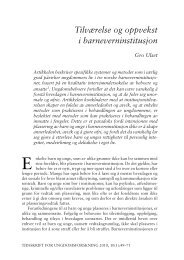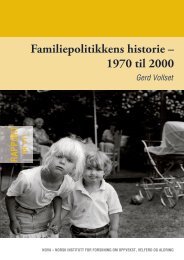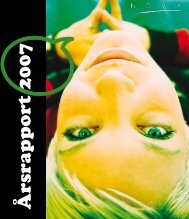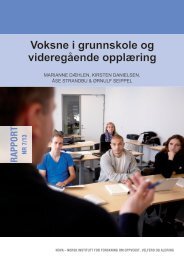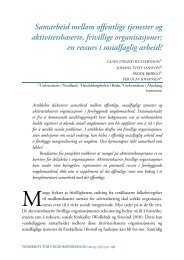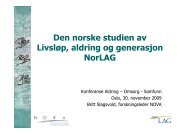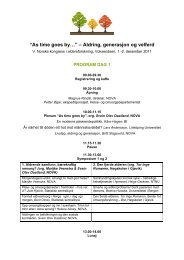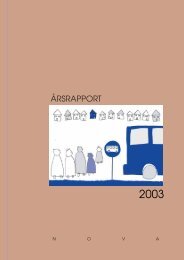Parents' socioeconomic status and children's academic ... - Nova
Parents' socioeconomic status and children's academic ... - Nova
Parents' socioeconomic status and children's academic ... - Nova
Create successful ePaper yourself
Turn your PDF publications into a flip-book with our unique Google optimized e-Paper software.
2 Hypotheses <strong>and</strong> possible mechanisms<br />
The paper is about the correlation between parental social <strong>status</strong> <strong>and</strong> the<br />
prospective social <strong>status</strong> of their children. This section introduces some<br />
conceptual issues that can help to explain this correlation. The discussion<br />
starts from the premise that even though children in the age group targeted<br />
here have lives of their own outside the family, their most immediate point<br />
of attachment <strong>and</strong> origin is still within the family.<br />
2.1 Cultural capital<br />
Bourdieu <strong>and</strong> others argue that households’ economic <strong>status</strong> is not sufficient<br />
to explain disparities in the educational attainment of the offspring. Inherited<br />
habits of the household are fundamentally connected to educational attainment.<br />
The term ‘cultural capital’ generally refers to people’s knowledge, skills<br />
<strong>and</strong> education level that may influence the <strong>status</strong> of the individual in the<br />
community. This <strong>status</strong> will be transmitted through generations. In other<br />
words, parents provide their offspring with the attitudes <strong>and</strong> knowledge<br />
needed for their educational <strong>and</strong> occupational success (Bourdieu <strong>and</strong><br />
Passeron 1990). The concept of cultural capital is widely used among sociologists<br />
in particular to explore the association between parents’ education<br />
level <strong>and</strong> their offspring’s educational <strong>and</strong> occupational choice <strong>and</strong> attainment.<br />
Anders Bakken (2003) summarises the mechanisms that may underlie<br />
correlations between parental education, parents’ social position <strong>and</strong><br />
children’s school achievement:<br />
1. Valuation of education: families of differing social <strong>status</strong> put different<br />
values on education <strong>and</strong> school outcomes.<br />
2. Children with differing <strong>socioeconomic</strong> backgrounds have differing<br />
access to books <strong>and</strong> school related input.<br />
3. Teachers may have higher expectations of pupils from families where<br />
the parents have a ‘solid educational background’. Higher expectations<br />
may induce pupils to make an extra effort <strong>and</strong> may encourage teachers<br />
to take notice of positive achievements.<br />
– Parents’ <strong>socioeconomic</strong> <strong>status</strong> <strong>and</strong> children’s <strong>academic</strong> performance – 11





